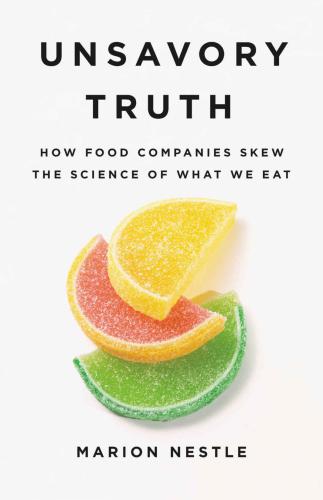
Unsavory Truth
How Food Companies Skew the Science of What We Eat
کتاب های مرتبط
- اطلاعات
- نقد و بررسی
- دیدگاه کاربران
نقد و بررسی

August 1, 2018
A leading nutritionist asks whether consumers can trust highly publicized research into whether food and beverages are healthy and safely produced.Nestle (Emerita, Nutrition, Food Studies, and Public Health/New York Univ.; Big Soda Politics: Taking on Big Soda (and Winning), 2015, etc.), who has a doctorate in molecular biology and a master's degree in public health nutrition and has conducted decades of research into food producers, is perfectly positioned for this topic. She makes the convincing case that because so much of the research is paid for by industries that benefit from the results, buyers should interpret the results skeptically. Many of Nestle's previous books, articles, and academic studies focused on specific types of food. Here, the author turns her attention to large corporations, investigating why they pay for supposedly independent researchers, why the quality of the research might be compromised by conflicts of interests, how consumers can separate reliable science from compromised science, and why consumers should lobby legislators, government regulatory agencies, and universities for reforms regarding the disclosure of conflicts. Nestle emphasizes research paid for and disseminated by the sugar/candy industry, producers of dairy foods, marketers of meat, and--in its own chapter, "A Case Study in Itself"--the soda giant Coca-Cola. Since the author is a prolific nutrition researcher who has accepted funding that could involve conflicts of interest, she admirably scrutinizes her own policies of funding and how she discloses it. Ultimately, researchers must act as ethicists as well as scientists. When her own studies and those of fellow researchers become marketing tools for multinational conglomerates, the author admits that she feels queasy about how consumers might be misled by the marketing. On the other hand, she writes, some studies paid for by industry can be trusted scientifically--and be marketed and advertised responsibly.Nestle proves yet again that she is a unique, valuable voice for engaged food consumers.
COPYRIGHT(2018) Kirkus Reviews, ALL RIGHTS RESERVED.

September 24, 2018
Nestle (Soda Politics) delivers a groundbreaking look at how food corporations influence nutrition research and public policy. Her focus, influenced by her own experience as a nutrition researcher, is on the myriad conflicts of interest created when food corporations fund research projects into public health. She opens with a Coca-Cola–backed study as an example of how corporations sponsor nutrition research that ultimately supports their own marketing goals—in this case, by backing researchers who showed exercise as more consequential than diet for influencing body weight. Nestle goes on to find many more examples of corporate-backed studies affecting the often misleading marketing consumers receive about the health benefits of various foods, including in the meat, yogurt, and milk industries. She also provides solutions for managing these conflicts of interest, acknowledging that not all industry-backed research is biased or false. To this end, Nestle cites several examples of organizations, such as World Obesity, that are paving the way for establishing ethical standards when using corporate funding. However, she insists that it is imperative to eventually disengage research from food industry funding altogether. General and specialist readers alike will appreciate this important message for consumers.

























دیدگاه کاربران